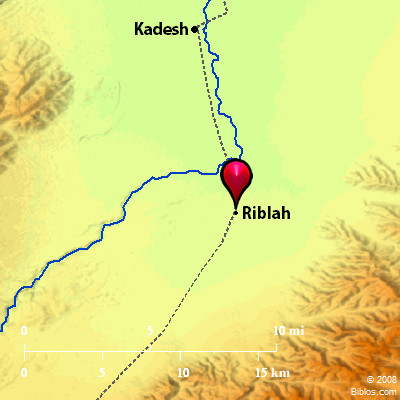Atlas  Riblah and surrounding area Maps Created using Biblemapper 3.0 Additional data from OpenBible.info Occurrences 2 Kings 23:33 Pharaoh Necoh put him in bonds at Riblah in the land of Hamath, that he might not reign in Jerusalem; and put the land to a tribute of one hundred talents of silver, and a talent of gold.2 Kings 25:6 Then they took the king, and carried him up to the king of Babylon to Riblah; and they gave judgment on him. 2 Kings 25:20 Nebuzaradan the captain of the guard took them, and brought them to the king of Babylon to Riblah. 2 Kings 25:21 The king of Babylon struck them, and put them to death at Riblah in the land of Hamath. So Judah was carried away captive out of his land. Jeremiah 39:5 But the army of the Chaldeans pursued after them, and overtook Zedekiah in the plains of Jericho: and when they had taken him, they brought him up to Nebuchadnezzar king of Babylon to Riblah in the land of Hamath; and he gave judgment on him. Jeremiah 39:6 Then the king of Babylon killed the sons of Zedekiah in Riblah before his eyes: also the king of Babylon killed all the nobles of Judah. Jeremiah 52:9 Then they took the king, and carried him up to the king of Babylon to Riblah in the land of Hamath; and he gave judgment on him. Jeremiah 52:10 The king of Babylon killed the sons of Zedekiah before his eyes: he killed also all the princes of Judah in Riblah. Jeremiah 52:26 Nebuzaradan the captain of the guard took them, and brought them to the king of Babylon to Riblah. Jeremiah 52:27 The king of Babylon struck them, and put them to death at Riblah in the land of Hamath. So Judah was carried away captive out of his land. Ezekiel 6:14 I will stretch out my hand on them, and make the land desolate and waste, from the wilderness toward Diblah, throughout all their habitations: and they shall know that I am Yahweh. Encyclopedia RIBLAHrib'-la (ribhlah; Rheblatha, with variants): RIBLAH of Numb. 34:11, may well be located at Ribleh on the river Orontes, 11 ms. n.e. of the great fountain Ain el Asi. It is here that the events of 2 Kings 23:33 and 25:6, took place, see also Jer. 39:5. Strong's Hebrew H7247: Riblaha city in Hamath, also one on N.E. border of Isr. |



